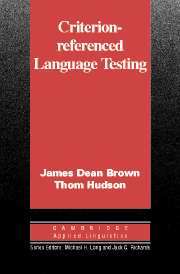Book contents
- Frontmatter
- Contents
- Series editors' preface
- Acknowledgements
- Preface
- 1 Alternate paradigms
- 2 Curriculum-related testing
- 3 Criterion-referenced test items
- 4 Basic descriptive and item statistics for criterion-referenced tests
- 5 Reliability, dependability, and unidimensionality
- 6 Validity of criterion-referenced tests
- 7 Administering, giving feedback, and reporting on criterion-referenced tests
- References
- Index
Preface
Published online by Cambridge University Press: 05 October 2012
- Frontmatter
- Contents
- Series editors' preface
- Acknowledgements
- Preface
- 1 Alternate paradigms
- 2 Curriculum-related testing
- 3 Criterion-referenced test items
- 4 Basic descriptive and item statistics for criterion-referenced tests
- 5 Reliability, dependability, and unidimensionality
- 6 Validity of criterion-referenced tests
- 7 Administering, giving feedback, and reporting on criterion-referenced tests
- References
- Index
Summary
In the mainstream educational testing literature, the notion of criterion-referenced testing dates back to Glaser and Klaus (1962), Glaser (1963), and Popham and Husek (1969), and has been steadily gaining acceptance ever since (see Popham (1978 & 1981) and Berk (1980a & 1984) for much more on criterion-referenced testing and its background; for recent examples of work in this area, see almost any recent issue of Journal of Educational Measurement or Applied Psychological Measurement. The authors of this book were both trained in ESL and Applied Linguistics at UCLA and, as part of that training, studied with such experts in educational measurement as Shavelson, Webb, Muthen, and Popham. Naturally, they were influenced by the work of these experts in criterion-referenced testing. It was therefore with some surprise that both authors realized ten or more years ago that criterion-referenced testing was largely being ignored in language teaching and research. As a result, during the past decade, we have been at the heart of a quiet revolution that has been brewing in language testing circles: steadily, year by year, the concept of criterion-referenced testing has been gaining importance in the language testing literature.
Although the concept of criterion-referenced testing seems to have first entered the language testing literature in 1968 with an article by Cartier in the TESOL Quarterly, it did not appear again until the 1980s.
- Type
- Chapter
- Information
- Criterion-Referenced Language Testing , pp. xiii - xviPublisher: Cambridge University PressPrint publication year: 2002

